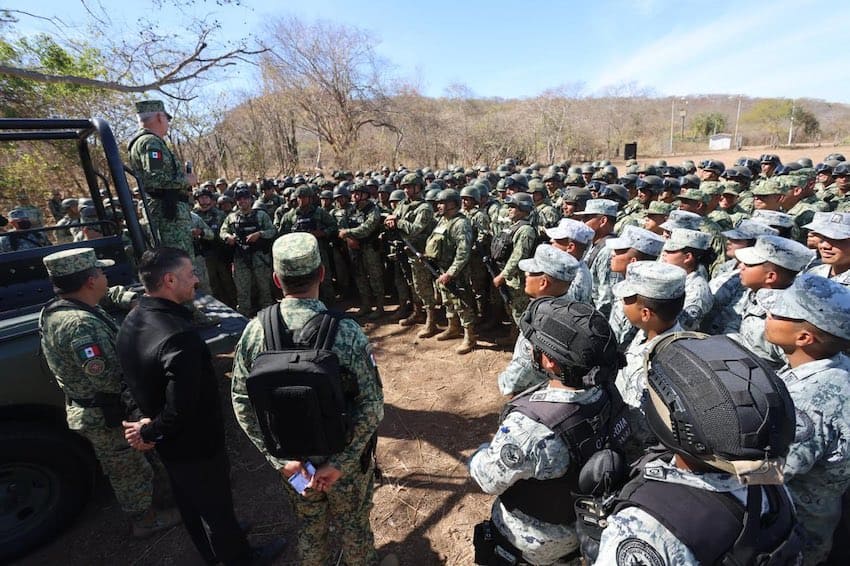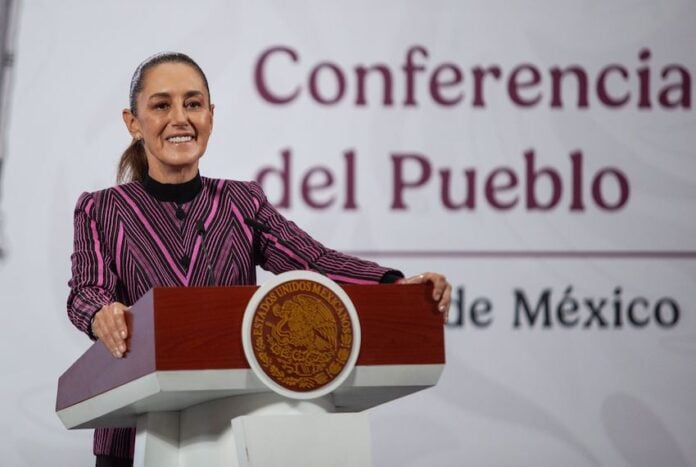World Cup-related tourism, job creation and the government’s security strategy were among the topics President Claudia Sheinbaum spoke about at her Wednesday morning press conference.
Here is a recap of the president’s Nov. 12 mañanera.
Government-endorsed ‘tourist routes’ to help World Cup visitors discover Mexico
A reporter asked the president whether the government has any plan to encourage 2026 FIFA World Cup tourists to do activities in Mexico beyond watching matches at the stadiums in Mexico City, Guadalajara and Monterrey.
He specifically cited visiting the Teotihuacán archaeological site in México state and eating barbacoa in Hidalgo as examples of activities the government could promote to foreigners who come to Mexico for the World Cup next June and July.
Sheinbaum responded that the government has developed “tourist routes linked to the arrival of tourists for the World Cup.”
The different routes will be presented next week or the week after, she said.
Sheinbaum didn’t provide a great deal of information about the World Cup “tourist routes,” but confirmed that a trip on the Maya Train railroad — which runs through the states of Tabasco, Campeche, Yucatán, Quintana Roo and Chiapas — is part of at least one of them.
She also said that Pueblos Mágicos (Magical Towns) are included on the routes.
“There are several activities that we’re going to present,” Sheinbaum said, referring to the tourist routes and other World Cup-related initiatives.
During her morning press conference on Monday, the president said that 5.5 million football fans will come to Mexico for the World Cup, a 48-team event in which matches will also be played in the United States and Canada.
“[It will be] a very special time with a very significant economic spillover,” she said.
Number of workers in formal sector jobs reaches record high
Referring to data published on Monday by the Mexican Social Security Institute (IMSS), Sheinbaum noted that the number of people in formal sector jobs increased by 217,491 in October.
She also noted that the total number of people in IMSS-affiliated formal sector jobs increased to a record high of just under 22.79 million at the end of October.
“It’s the highest figure ever recorded,” Sheinbaum said.
“… We’ve experienced a complex year because of the [U.S.] tariffs, due to the international situation, but even so, the peso today is at … 18.29 [to the US dollar] … and there is job creation. It means we’re doing well,” she said.
Just under 551,000 IMSS-affiliated formal sector jobs have been created so far this year, a figure that lags the pace at which such jobs were added in the first 10 months of 2023 and 2024.
Still, the creation of more than half a million formal sector jobs during a period in which the economy was barely growing, and even contracting in certain periods, is a net positive.
The national unemployment rate, at 3%, remains low, although it has trended up this year.
Meanwhile, the percentage of workers employed in Mexico’s vast informal sector remains stubbornly high at just under 55% in September, according to the national statistics agency INEGI.
The National Guard is a ‘great institution,’ says Sheinbaum
A reporter asked the president her opinion about an article published by The Economist on Monday under the headline “Mexico has become a less deadly place under Claudia Sheinbaum.”
The Economist acknowledges that murders have declined since Sheinbaum took office, but also states that “there is still an enormous amount to do in a country deeply in hock to gangsters.”

Instead of giving a direct response to the reporter’s question, Sheinbaum took the opportunity to speak about her government’s approach to public security.
“The National Guard is an institution that is being strengthened,” she said, referencing one of the four core tenets of the government’s security strategy.
“It’s different from what the Federal Police was. It’s a new institution formed by president López Obrador, and which has to be strengthened. It’s a great institution, it is highly regarded by the people of Mexico, but it has to continue improving,” Sheinbaum said.
The president also spoke about her government’s commitment to improving intelligence and investigative practices, addressing the root causes of crime, reducing impunity, and strengthening public institutions.
Near the end of its article, The Economist noted that “on November 3rd NBC News reported that the United States is drawing up plans for operations inside Mexico to target gang leaders.”
“Such sabre-rattling creates tensions, but may also give Ms Sheinbaum cover to be bold,” the publication wrote, adding:
“No amount of boldness will rebuild Mexico’s hollowed-out security institutions and break the gangs’ grip during the single six-year term that the constitution affords Ms Sheinbaum. More complete success will be for her successor.”
That successor, The Economist suggested, could be current Federal Security Minister Omar García Harfuch.
By Mexico News Daily chief staff writer Peter Davies (peter.davies@mexiconewsdaily.com)
